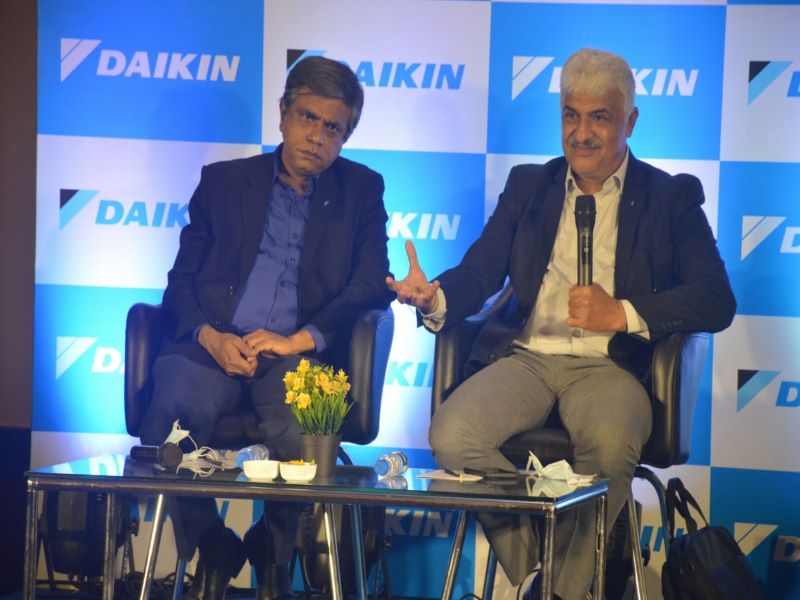 Daikin
Daikin
Daikin India aiming at bigger export target after PLI push
Kolkata: Japanese air conditioning manufacturer Daikin is ramping up its manufacturing capacity in India with a third factory in the country to supply the Middle East, African, and Latin American markets and cater to the growing Indian market.
After being chosen as one of the beneficiaries of the Product Linked Incentive (PLI) scheme aimed at boosting the local component supply ecosystem for the white goods sector, one of the world’s largest makers of air-conditioning equipment is setting up a production unit for compressor, PCB, and motor for its room air conditioners manufactured in India.
Daikin has acquired 75 acres of land for its third plant at Andhra Pradesh's Sri City, close to Chennai.
Addressing a press conference in Kolkata on Thursday, Daikin India Director and Senior Vice-President Kuldeepak Virmani said the company has committed a Rs 1,000 crore investment in the Siri City plant for the first phase as part of the PLI scheme announced by the Centre last year.
Of the Rs 1000 crore to be invested in the initial phase, 50 percent will be invested in manufacturing air conditioners while the rest will be directed towards component manufacturing, Daikin's top official said, adding that this investment will be increased to Rs 2,500 crore in the second phase.
The first phase will commence from the second or third quarter of FY23-24, and the second phase will be launched two years later, Virmani said.
Virmani said the PLI scheme will provide a conducive manufacturing environment and propel India's position as a manufacturing hub.
"At first, we acquired only 47 acres of land to set up the third factory. After the PLI scheme was announced, we immediately acquired 28 acres of land adjacent to the existing land for manufacturing compressors, which is a very critical component of air conditioners, as well as PCBs and motors," he said.
.jpeg)
"Currently we are importing compressors from Thailand, PCBs from Taiwan... after the government's incentive push and the subsequent green signal from our headquarters in Japan, we immediately acquired another 28 acres to set up the component manufacturing hub," he added.
Since Daikin has been working on making India its manufacturing hub, Virmani said the company aims to increase its export of room ACs from India in terms of export value to 20 percent by FY25 and to 40 percent by FY30.
Currently, this figure stands at less than 10 percent, he revealed.
Virmani said in the first phase Diakin is setting up a capacity of manufacturing 2 million compressors in the Siri City factory, mainly for captive consumption, and another two to three million capacity will be installed in the next phase for the export market.
Setting up component units in India will make the manufacturing units self-reliant with reduced dependence on imports and the necessity to maintain inventories for one month to 45 days.
With lower imports and advantages induced PLI scheme, he added, the pricing will be competitive and the AC prices may go down by 6 to 7 percent. "For example, a Rs 35,000 air conditioner should cost Rs 2,000 less."
Owing to low penetration of just 6 percent, India has huge growth potential for the air conditioning market.
"We are hoping that this HVAC industry, as a whole, will grow from its current size of Rs 20,000 crore. As per the research of Boston Consulting Group and many other research consultants, this industry has the potential to grow to Rs 1 lakh crore by 2030," Virmani said.
"Even small countries like Thailand, Indonesia, Malaysia have a penetration of over 15 percent. China has a penetration of more than 40 percent while Japan is almost at 70-80 percent," he pointed out.
Asked about the impact of the Covid-19 pandemic, Virmani said Diakin was close to its pre-covid turnover in the third quarter of the current financial year (FY22).
"After two months of washout in April-May, there was a very strong recovery when the markets opened in June, marked by strong demand as the weather was still hot. We almost touched 2019-20 numbers in December. We are expecting very strong growth in this quarter," he said.
"Industry-wise, from June to January, the growth has been good, and we are pleased to share with you that most of the players have bounced back to the 90 percent of their FY2019-20 numbers by the end of December," he added.
Daikin's turnover in 2019-2020 stood at Rs 5,000 crore but dropped to Rs 4,300 crore in 2020-21 owing to the Covid-19 pandemic but with the positive trends, it may get close or even achieve the 2019-2020 numbers.
"The market is looking positive and if there is a good summer and the Covid-19 situation doesn't worsen, we expect to register 5-7 percent growth over FY 2019-20," he said, adding that in the FY22-23, Daikin is planning to sell 1.3 million air conditioners in India.
Support Our Journalism
We cannot do without you.. your contribution supports unbiased journalism
IBNS is not driven by any ism- not wokeism, not racism, not skewed secularism, not hyper right-wing or left liberal ideals, nor by any hardline religious beliefs or hyper nationalism. We want to serve you good old objective news, as they are. We do not judge or preach. We let people decide for themselves. We only try to present factual and well-sourced news.







